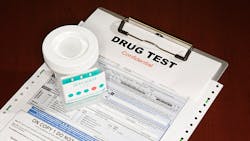OSHA Reporting Rules Discourage Use of Mandatory Post-Accident Drug Testing
On May 12, 2016, OSHA published the final version of new workplace injury reporting rules intended to “Improve Tracking of Workplace Injuries and Illnesses.” Among other changes, the rules clarify the implicit requirement that an employer’s personnel policies must not “deter or discourage” employees from reporting work-related injuries and illnesses.
This is important because commonly used drug testing policies may now be considered unlawful by OSHA if they are not properly drafted. A group of industry associations recently filed a lawsuit in federal court challenging the enforceability of the new rule. But the legal challenge to the regulation will not be resolved prior to the time the regulation is set to become effective (August 10, 2016). Therefore, employers should consider reviewing their drug testing policy prior to August 10, 2016 and monitoring the outcome of the federal law suit challenging OSHA’s new injury reporting regulation.
In the final rule, OSHA cites studies which suggest that “blanket” post-accident drug-testing policies (i.e. policies that require drug testing after every reported workplace accident or injury regardless of the circumstances) tend to discourage the reporting of workplace accidents/injuries and are viewed by employees as an invasion of privacy. To strike the appropriate balance between the duty to maintain a safe workplace, satisfy regulatory reporting requirements and respect employee privacy, OSHA advises that company “drug testing policies should limit post-incident testing to situations in which employee drug use is likely to have contributed to the incident, and for which the drug test can accurately identify impairment caused by drug use.”
This rule will not apply to government entities and it yields to an employer’s obligation to comply with other state or federal laws and regulations which may require post-accident drug testing (e.g. Department of Transportation regulations and state workers compensation laws).
Key Takeaways:
- OSHA believes that, unless otherwise required by law, private employers should not maintain blanket drug testing policies that require drug testing after every reported workplace injury or accident. For example, it would likely not be reasonable to drug test an employee who reports a bee sting, a repetitive strain injury, or an injury caused by a lack of machine guarding or tool malfunction.
- OSHA advises that post-accident and/or post-injury drug testing should be limited to situations where the facts indicate that drug use likely contributed to the incident.
- If drug tests accurately detecting actual impairment are available, they should be used over tests that only indicate past drug use.
In addition to modifying blanket post-accident testing policies, employers may also wish to consider different approaches. For example, in states where it’s permitted, employers may want to require testing following employee safety infractions that could have been caused by drug use, whether or not an injury occurred. Another alternative, particularly where drug use is suspected, would be to increase the frequency and scope of random drug testing. As with any change in regulations, employers should consult their attorneys to determine the proper steps for complicance.
Brian Peterson is a labor and employment attorney at Spencer Fane LLP. He focuses his practice on helping businesses avoid employment-related lawsuits and defending them in employment law matters.
